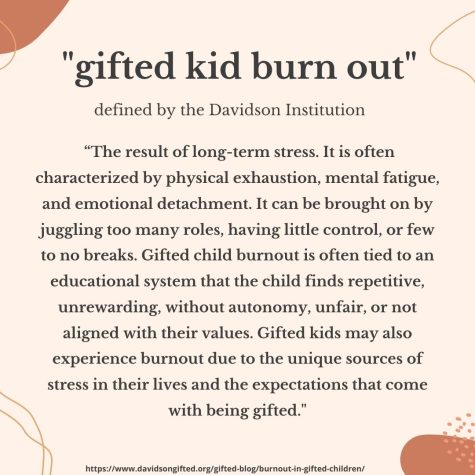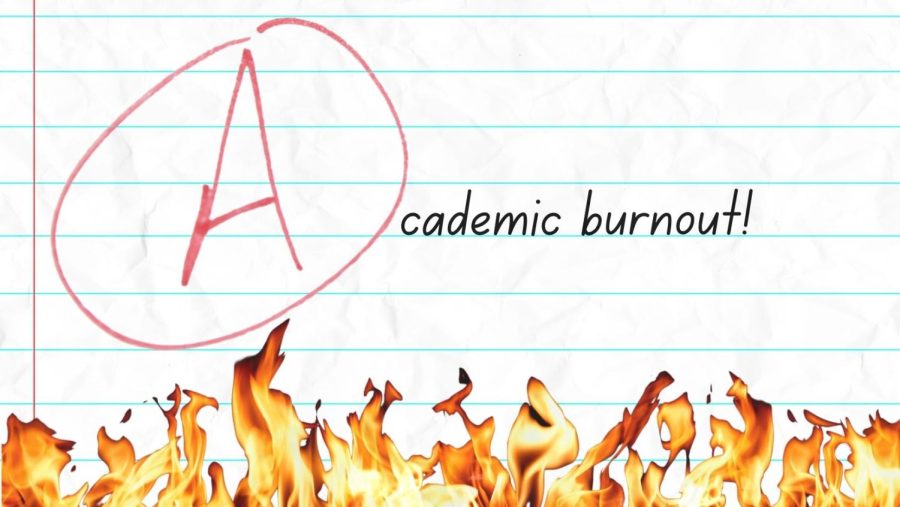Academic burnout: the plague in American highschools
While parents and teachers love to blame poor grades on too much social media usage and a lack of motivation, students struggling with academic burnout can quickly fall behind due to other issues. Since students cannot drive themselves to the pharmacy and purchase an academic burnout prevention pill, they must come to terms with the realities of academic burnout and learn how to cure themselves.
March 11, 2022
Frequently assumed to embody “the best four years of one’s life”, high schoolers put immense pressure on themselves to maintain a social life while simultaneously earning exemplary grades to gain university admission. As popularized and dramatized in iconic films such as “Mean Girls”, “Clueless” and “The Breakfast Club” numerous high schoolers struggle to achieve the desired equilibrium between academic and social lives. This failed equilibrium relates back to one factor: academic burnout. Top Universities define academic burnout as “[what] happens when academic work and home life seem overwhelming and students think they can’t cope anymore. They might feel tired, anxious and like they can’t focus on anything.”
Academic burnout attacks students with hectic schedules and numerous commitments. Overcommitting oneself to appease parents or strengthen a resume quickly turns futile when students become fatigued from overworking themselves. Sports, fine arts activities and clubs demand a large portion of a student’s attention and time. Although sometimes achievable, participating in various extracurriculars can present a challenge: conflicting commitments and not enough time. When trying to balance the rigor of involving oneself in multiple after-school activities, several students find themselves with conflicting schedules. Struggling to devote time to an overwhelming amount of commitments can negatively impact the quality of a student’s academic output. Staying after school for countless hours every day running back and forth from varying extracurriculars leaves little time for students to study and complete homework.
As countless students try to become “well-rounded”, adopting this persona should come with a cautionary tale. To prevent the symptoms of an overcommitted schedule students should limit and prioritize extracurriculars. Ultimately no matter how high the number of clubs, sports and fine arts activities one participates in, good grades and test scores still constitute the pivotal key in earning college admissions.
Ironically, students labeled as “gifted” early in life can easily fall victim to academic burnout. Researchers classify this phenomenon as “gifted kid burnout”.

Academic success came easy for gifted students for the majority of their lives. In a high school setting where gifted students typically find themselves bogged down with AP and dual enrollment classes, academic success may not come as naturally. Actually having to suddenly exert effort and study may pose a challenge for gifted students. Since academic success always seemed second-hand, numerous students in this demographic failed to learn how to properly study. Unfortunately, this can manifest a lack of motivation and exponentially harm students’ self-esteem and self-image.
In addition to stressing about strictly academic endeavors, one’s social life, popularity and youthful romance can quickly consume the better part of a typical high schooler’s daily life. Although people may think a juvenile crush or trivial breakup will not overtake a high schooler’s mind, in reality, a teenager’s love life can quickly consume the majority of one’s thoughts. Unfortunately, this can inevitably affect a student’s academic achievement.
Since the unprecedented Coronavirus pandemic, academic burnout has emerged in schools more than ever before. As most of the nation’s youth participated in virtual learning at some point over the past two years, academic burnout harmed students as they returned to in-person learning. With unlimited online resources at their fingertips, a multitude of high schoolers found virtual learning significantly less taxing than face-to-face instruction. Often completing assignments and taking exams from bed, students needed to exert little to no effort to complete classwork. Returning to school at the conclusion of online learning confronted students with a rude awakening.
The juxtaposition of academic burnout and unfamiliarity with an in-person course load negatively affected numerous students. Students tired of completing repetitive assignments and unused to not running to google when taking tests found it harder to stay afloat in an academic setting.
“Without a balance with your academic life and extracurriculars, there’s no time for yourself. Having a busy schedule will burn you out especially if you don’t take care of yourself. I can’t do good in school or my extracurriculars if I don’t take care of my mental and physical health,” senior class Vice President Kiana Hawley said.
Recognizing the early signs and causes of academic burnout will allow students to preserve GPAs and maintain mental health while simultaneously escaping and mitigating the destructive ramifications of academic burnout.







